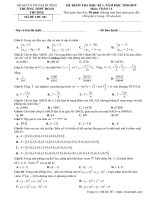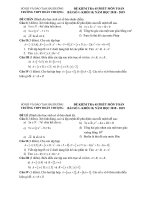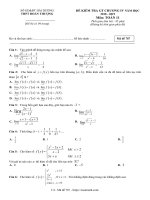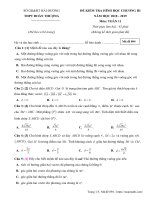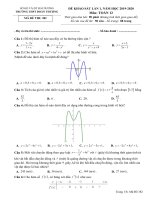Đề thi giữa học kì 1 môn Tiếng Anh lớp 12 năm 2021-2022 có đáp án - Trường THPT Đoàn Thượng
Bạn đang xem bản rút gọn của tài liệu. Xem và tải ngay bản đầy đủ của tài liệu tại đây (372.13 KB, 6 trang )
SỞ GD&ĐT HẢI DƯƠNG
TRƯỜNG THPT ĐOÀN THƯỢNG
MÃ ĐỀ : 132
ĐỀ KIỂM TRA GIỮA KÌ I – NĂM HỌC 2021 - 2022
Môn: TIẾNG ANH 12 CO BAN
Thời gian làm bài: 45 phút ( không kể thời gian giao đề)
Số câu của đề thi : 40 – Số trang : 04
Mark the letter A, B, C. or D on your answer sheet to indicate the word(s) CLOSEST in meaning to the
underlined word(s) in each of the following questions.(1.0 p)
1. When you sit for the exam tomorrow, try to stay calm and relaxed.
A. answer
B. take
C. write
D. make
2. My friend's family always splits the housework equally - his mom cooks, his dad cleans the house and he
does the washing-up.
A. pick up
B. break
C. join
D. share
3. She didn't think John's comments were very appropriate at the time.
A. seriously
B. impolite
C. suitable
D. incorrect
4. A survey was made to determine their attitudes toward love and marriage.
A. catch up
B. find out
C. fill in
D. look for
Choose the best answer to complete each of the following sentences (3.5 p)
5. We should warn the children ________to strangers.
A. not to speak
B. not to speaking
C. to speak
D. not speak
6. Jane Fonda does not care much of work but generally __________ only with colleagues for meals or
movies.
A. attention
B. socializes
C. supposes
D. discussed
7. Lan's grandmother takes __________ for looking after the house.
A. responsibility
B. possibility
C. ability
D. probability
8. The British usually pay a lot of _________ to good table manners and are expected to use knives, forks
and spoons properly.
A. care
B. money
C. compliment
D. attention
9. Huong didn't participate in the contest ________ her lack of confidence.
A. although
B. despite
C. because of
D. since
10. By the end of this year, they ________English for 8 years.
A. will have learnt
B. have learnt
C. learnt
D. had learnt
11. Nancy: Your English is perfect! What a wonderful voice you have!
David: "___________".
A. Thank you. You are right
B. That's alright
C. You must be kidding! I still have to try a lot
D. No problem!
12. They congratulated him ________ his success.
A. about
B. with
C. toward
D. on
13. Jane: "What a beautiful wedding dress you are wearing today, Daisy!"
Daisy: "___________."
A. Don't mention it
B. Thanks for your gift
C. I'm sorry to hear that
D. Thanks, it's nice of you to say so
It's
necessary
to
listen
__________
opinions
that
are
different from ours.
14.
A. for
B. about
C. with
D. to
1 – 12CB – MA DE 132
15. Five years ago people started to preserve the ________houses and the famous landscape.
A. traditional
B. traditions
C. traditionally
D. tradition
16. She said that__________.
A. She had been tired last night.
B. She had been tired the night before
C. She was very tired the night before.
D. She was very tired last night
17. Pointing at someone to catch his/her ________ is usually considered rude in most social situations.
A. approach
B. signal
C. eye
D. assistance
18. By the time her father telephoned, Mai __________watching TV.
A. had already stopped
B. have already stopped
C. stopped
D. has already stopped
Mark the letter A, B, C, or D on your answer sheet to indicate the word whose underlined part differs
from the other three in pronunciation in each of the following questions.(1.0 p)
19. A. mended
B. faced
C. consisted
D. waited
20. A. enjoyed
B. watched
C. remembered
D. called
21. A. attends
B. joins
C. travels
D. accidents
22. A. arrives
B. matches
C. villages
D. sacrifices
Read the following passage and mark the letter A, B, C, or D to indicate the correct word or phrase that
best fits each of the numbered blanks. (1.25 p)
We can (23)_______ with other people in many different ways. We can talk and write, and we can
send messages with our hands and faces. There is also the phone (including the mobile!), the fax, and email. Television, film, painting, and photography can also communicate ideas.
Animals have ways (24)_______ exchanging information, too. Bees dance and tell other bees where to
find food. Elephants make sounds (25)_______ humans can't hear. Whales sing songs. Monkeys use their
faces to show anger and love. But this is nothing compared to what people can do. We have language about 6,000 languages, in fact. We can write poetry, tell jokes, make promises, explain, persuade, tell the
truth, or tell lies. And we have a sense of past and future, not just present.
Radio, film, and television (26)_______ a huge influence on society in the last hundred years. And now we
have the Internet, which is infinite. But what is this doing to this? We can give and get a lot of information
very quickly. But there is (27)_______ information that it is difficult to know what is important and what
isn't. Modern media is changing our world every minute of every day.
23. A. speak
B. communicate
C. suppress
D. receive
24. A. of
B. at
C. in
D. on
25. A. whom
B. that
C. who
D. whose
26. A. have
B. had
C. are having
D. have had
27. A. too much
B. too many
C. so much
D. so many
Read the following passage and mark the letter A, B, C, or D to indicate the correct answer to each of the
questions. (1.25 p)
Communication in general is process of sending and receiving messages that enables humans to share
knowledge, attitudes, and skills. Although we usually identify communication with speech, communication is
composed of two dimensions - verbal and nonverbal.
Nonverbal communication has been defined as communication without words. It includes apparent behaviors
such as facial expressions, eyes, touching, tone of voice, as well as less obvious messages such as dress, posture
and spacial distance between two or more people.
2 – 12CB – MA DE 132
Activity or inactivity, words or silence all have message value: they influence others and these others,
in turn, respond to these communications and thus they are communicating.
Commonly, non-verbal communication is learned shortly after birth and practiced and refined throughout a
person's lifetime. Children first learn nonverbal expressions by watching and imitating, much as they learn verbal
skills.
Young children know far more than they can verbalize and are generally more adept at reading nonverbal
cues than adults are because of their limited verbal skills and their recent reliance on the nonverbal to communicate.
As children develop verbal skills, nonverbal channels of communication do not cease to exist although become
entwined in the total communication process.
28. According to the writer, __________.
A. One cannot communicate in both verbal and nonverbal language.
B. Nonverbal language is only used by the deaf and the mute.
C. People communicate with both verbal and nonverbal language.
D. Those who can listen and talk should not use nonverbal language.
29. According to the 4th paragraph, human beings __________.
A. communicate in nonverbal language much less than they do in verbal language
B. have learnt how to communicate in nonverbal language through books
C. have learnt how to communicate in non-verbal language since a child
D. can communicate in nonverbal language only when they are mature
30. The word reading has a close meaning to _______.
A. looking at the words that are written
B. expressing
C. saying something aloud
D. understanding
31. We can learn from the text that __________.
A. even silence has message value
B. touching is not accepted in communicating
C. most people do not like nonverbal communication D. non-verbal can never get any responses
32. Which is not included in nonverbal communication?
A. tone of voice
B. words
C. facial expressions
D. spacial distance
Mark the letter A, B, C, or D on your answer sheet to indicate the sentence that is closest in meaning to
each of the following questions.(1.0p)
33. It's 9 years since I last saw my uncle.
A. I haven't seen my uncle for 9 years
B. I last saw my uncle 9 years.
C. The last time I saw my uncle is 9 years.
D. I see my uncle once every 9 years.
34. "I'm sorry. I was rude to you yesterday." Jack said to An.
A. Jack apologized of being rude to An yesterday.
B. An apologized for being rude to Jack yesterday.
C. Jack apologized to An for being rude to her the day before.
D. An apologized Jack for being rude to him the previous day.
35. "I am going to be there at noon." Julia says .
A. Julia says that she was going to be there at noon.
B. Julia says that she can be there at noon.
C. Julia says that she is going to be there at noon
D. Julia says that I am going to be there at noon.
3 – 12CB – MA DE 132
36. She has never attended a volleyball match before.
A. She used to attend a volleyball match.
B. It is the first time she has attended a volleyball match.
C. It is the first time she had attended a volleyball match.
D. It's the last time she attended a volleyball match.
Mark the letter A, B, C or D to indicate the underlined part that needs correction in each of the following
questions . ( 1.0 p)
37. The wedding preparations take weeks but the actual celebrate takes less than an hour.
A
B
C
D
His
classmates
haven't
seen
each
other
from
they
graduated
from
high
school
3 years ago.
38.
A
B
C
D
James
left
his
house
in
a
hurry
without
to
say
goodbye
to
us.
39.
A
B
C
D
40. First the interviewer asked Jane what her name was, and where she comes from.
A
B
C
D
***** THE END*****
4 – 12CB – MA DE 132
Đáp án mã đề: 132
01. B;
02. D;
06. B;
07. A;
11. C;
12. D;
16. B;
17. C;
21. D;
22. A;
26. D;
27. C;
31. A;
32. B;
36. B;
37. C;
Đáp án mã đề: 209
01. B;
02. C;
06. B;
07. C;
11. C;
12. B;
16. A;
17. A;
21. A;
22. B;
26. D;
27. C;
31. D;
32. C;
36. C;
37. C;
Đáp án mã đề: 357
01. A;
02. B;
06. C;
07. D;
11. B;
12. D;
16. C;
17. B;
21. A;
22. D;
26. C;
27. A;
31. C;
32. C;
36. B;
37. C;
Đáp án mã đề: 485
01. C;
02. B;
06. C;
07. A;
11. C;
12. D;
16. D;
17. A;
21. B;
22. D;
26. D;
27. C;
31. A;
32. A;
36. B;
37. C;
03. C;
08. D;
13. D;
18. A;
23. B;
28. C;
33. A;
38. B;
04. B;
09. C;
14. D;
19. B;
24. A;
29. C;
34. C;
39. C;
05. A;
10. A;
15. A;
20. B;
25. B;
30. D;
35. C;
40. D;
03. D;
08. A;
13. D;
18. A;
23. A;
28. B;
33. C;
38. D;
04. C;
09. A;
14. A;
19. D;
24. C;
29. A;
34. C;
39. D;
05. D;
10. B;
15. C;
20. B;
25. B;
30. D;
35. D;
40. B;
03. A;
08. D;
13. C;
18. B;
23. B;
28. C;
33. C;
38. D;
04. B;
09. B;
14. A;
19. A;
24. C;
29. C;
34. D;
39. B;
05. A;
10. A;
15. B;
20. D;
25. D;
30. A;
35. B;
40. C;
03. C;
08. B;
13. A;
18. C;
23. D;
28. C;
33. D;
38. B;
04. B;
09. D;
14. B;
19. C;
24. A;
29. D;
34. A;
39. D;
05. A;
10. B;
15. B;
20. A;
25. B;
30. B;
35. C;
40. C;
